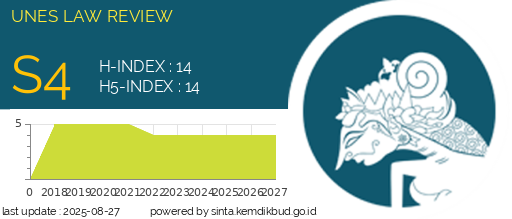THE LEGAL CONSEQUENCES OF CONSTITUTIONAL COURT DECISION NO. 18 OF 2014 ON THE ENFORCEMENT OF CRIMINAL LAW CONCERNING HAZARDOUS AND TOXIC WASTE AGAINST CORPORATIONS
DOI:
https://doi.org/10.31933/unesrev.v5i4.524Keywords:
Constitutional Court Decision, Hazardous And Toxic Waste, Corporations, Criminal Law Enforcement, Environmental OffensesAbstract
This research aims to examine the legal consequences of Constitutional Court Decision No. 18 of 2014 regarding the case of hazardous and toxic waste against corporations. Furthermore, the study also analyzes the enforcement of criminal law concerning hazardous and toxic waste against corporations after the Constitutional Court's decision. The Constitutional Court's Decision No. 18 of 2014 has significant implications for the enforcement of criminal law concerning hazardous and toxic waste by corporations. It provides guidance and limitations on how the law should be interpreted and applied in cases related to environmental offenses committed by corporations. The research will focus on evaluating the post-decision enforcement of criminal law against corporations involved in hazardous and toxic waste cases. It will examine the roles of law enforcement agencies, such as the police, prosecutors, and the judiciary, in investigating, prosecuting, and adjudicating cases involving corporations and hazardous waste. Additionally, the study will explore the protection of human rights and access to justice for victims affected by hazardous and toxic waste. It will also investigate preventive measures and regulatory frameworks aimed at deterring environmental offenses by corporations. The research will employ a combination of legal analysis, case studies, and comparative studies to examine the effectiveness of the enforcement of criminal law in light of the Constitutional Court's decision. It will contribute to the understanding of the legal implications and challenges faced in prosecuting and holding corporations accountable for hazardous and toxic waste.
Downloads
References
Jan Marinka, 2018. Reformasi Kejaksaan dalam Sistem Hukum Nasional. Jakarta: Sinar Grafika,
Jimly Asshiddiqie, 2009, Green Constitution, Nuansa Hijau Undang-Undang Dasar Negara Republik Indonesia Tahun 1945, Jakarta: Raja Grafindo Persada,
Muladi, 1995, Kapita Selekta Sistem Peradilan Pidana, Semarang: Badan Penerbit Undip
Romli Atmasasmita, 1996. Sistem Peradilan Pidana (Criminal Justice System) Perspektif Eksistensialisme Dan Abolisionalisme. Jakarta: Bina Cipta.
Siti Sundari Rangkuti, 2000. Izin Lingkungan sebagai Instrumen Pencegahan Pencemaran Lingkungan, Surabaya: Universitas Airlangga,,
Siti Sundari Rangkuti, 2005. Hukum Lingkungan dan Kebijaksanaan Lingkungan Nasional, Surabaya: Airlangga University Press,
Takdir Rahmadi, 2011. Hukum Lingkungan di Indonesia, Jakarta: PT. Raja Grafindo Persada,
Bukit, N., Ginting, E. M., Hutagalung, E. A., Sidebang, E., Frida, E., & Bukit, B. F. 2019. “Preparation and characterization of oil palm ash from boiler to nanoparticle”. Reviews on Advanced Materials Science, 58(1), 195–200,
Henry Loekito, 2002, “Teknologi Pengelolaan Limbah Industri Kelapa Sawit”, Jurnal Teknologi Lingkungan, 3(3),
Muliari Dan Zulfahmy, 2016, “Dampak Limbah Cair Kelapa Sawit Terhadap Komunitas Fitoplankton Di Sungai Krueng Mane Kabupaten Aceh Utara”, Jurnal Perikanan Dan Kelautan, 6(2),
http://www.nasional.tempo.co/berita/baca Indonesia Jadi Importir Limbah B3 dikunjungi pada tanggal 5 mei 2023
http://www.menlh.go.id/berita Kemajuan Penanganan Pidana Kasus Impor Limbah B3 di Pulau Galang Baru Batam dikunjungi pada tanggal 5 mei 2023
Downloads
Published
How to Cite
Issue
Section
License
Hak cipta :
Penulis yang mempublikasikan manuskripnya di jurnal ini menyetujui ketentuan berikut:
- Hak cipta pada setiap artikel adalah milik penulis.
- Penulis mengakui bahwa UNES Law Review berhak menjadi yang pertama menerbitkan dengan lisensi Creative Commons Attribution 4.0 International (Attribution 4.0 International CC BY 4.0) .
- Penulis dapat mengirimkan artikel secara terpisah, mengatur distribusi non-eksklusif manuskrip yang telah diterbitkan dalam jurnal ini ke versi lain (misalnya, dikirim ke repositori institusi penulis, publikasi ke dalam buku, dll.), dengan mengakui bahwa manuskrip telah diterbitkan pertama kali di Jurnal UNES Law Review.



















